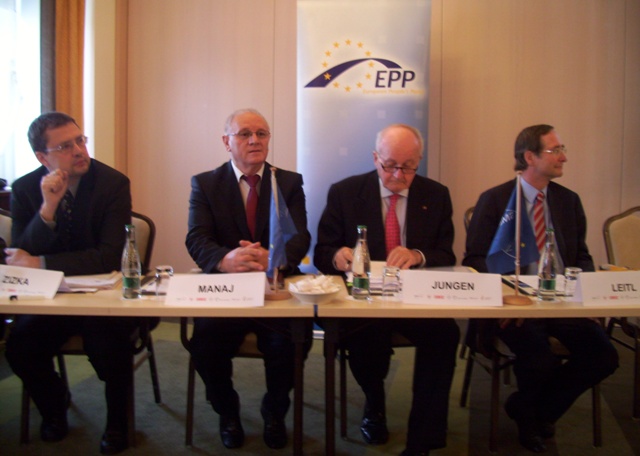Prishtina, 13 May 2009
The following is the speech of the Deputy Prime Minister of the Republic of Kosovo, Ramë Manaj.
Ladies and gentlemen,
I thank you for this wonderful opportunity you have given me to be here with you at this conference, which I am sure will provide opportunities for SMEs (small and middle sized enterprises) at this time of the global crisis, and this will help the economy and enterprises confront and influence sustaining the economic and development levels.
As you know, the influence of the small businesses sector, in employment and the dynamism of the economy in many industrialized countries, is extraordinary; including its influence on economic growth, employment, reducing poverty, innovation, demand, etc.
We have accepted the fact that the private sector is the only sector which can answer to the diversity of market demand. An economy led by private initiatives has proven to be skilled at generating and regenerating economic growth in a country, absorbing a new workforce and reducing poverty.
The role of small and middle-sized enterprises is extraordinarily great. In countries with low GDP income of between $100 to $500 per capita, SMEs contribute to over 60% of the creation of GDP and 70% of the total workers employed; whilst in countries with average GDP, SMEs contribute to over 70% of the creation of GDP and 95% of the total workers employed.
But what is the role of SMEs in Kosovo’s economic development and what is the Kosovar Government undertaking to deal with the effects of the global crisis?
The absolute majority of businesses registered are micro-businesses (1–9 workers), and the greatest number of workers employed are in this category of businesses. According to the number of employees registered in this category; there are 151,434 employees or 61.12%. In small businesses; there are 21,329 workers employed or 8.60%, and in middle sized businesses; 21,361 workers are employed or 8.62%.
Large enterprises, those employing more than 250 workers, comprise of social and public enterprises (KEK, PTK, etc.) and in large enterprises; there are 53,658 workers employed or 21.66% of those employed in registered businesses.
The SME sector in Kosovo has an extraordinarily great importance in absorbing new jobs since about 194,124 or 78.44% of all workers employed in businesses are absorbed by this sector or taking the total employed in Kosovo (Private sector ≈ 247,782 + Public sector ≈ 75,000, Total ≈ 322,782); it appears that the SME sector is responsible for the employment of over 60% of workers; a percentage which overtakes the American average, is lower than that of the Japanese, and equal to that of the EU countries.
In the absence of statistics, the contribution of SMEs to the creation of GDP and the state budget is not known, although on the basis of some preliminary calculations, this contribution is between 40-55%. However, the contribution of the SME sector, also from the aspect of the development of the economic sector, is irreplaceable and fundamental; since SMEs are the only organizations which populate the most marginalized sectors. Bearing in mind their broad spread among various sectors, SMEs are well known for another affinity which is fulfilling the diversity of the needs of society, which due to their distinct requirements; never manage to become large industries with a broad spread or a high profit base.
The challenges facing SMEs in Kosovo and alternatives of the Kosovar Government to improve their position.
The challenges facing the SME sector in Kosovo are many and varied. On the basis of periodic investigations done by the Government of Kosovo through the Agency for Supporting Small and Middle Sized Enterprises and on the basis of investigations done by other domestic or international institutions; there exists a broad consensus that there are many barriers of different character.
The agency, for a considerable amount of time, has managed to systematize and address the main barriers which have been faced for many years by the SME sector in Kosovo, by business representatives and public scientific, academic and political authorities.
I will mention here a broad range of these barriers: beginning from the macro-economic factors, including; obstacles to foreign investment and access to international credit, a recession (national and international), government budgetary limits, high interest; the lack of electricity, a slow process of privatization, etc. Then there is non-developed infrastructure including: market information systems, transport systems, distribution systems, business spaces etc.; the business atmosphere including: limited tradition of business, policies of favoritism, etc.; then the informal sector including: disloyal competition, fiscal evasion, etc.; access to finance including: limited flows of foreign investment, low returns in most businesses, short periods of return of credit, etc.; technology including: unsatisfactory development of institutions and mechanisms of commercialization and the transfer of technology, the absence of financing for research, development and improvement of technology and modernization of the production process and high customs duties for modern equipment.
The Government of Kosovo is involved in implementing the process of the European Charter for small enterprises, and for many years has been dealing with the design of programs and projects aiming to gradually overcome these barriers and to offer our businesses an atmosphere for sustainable development. The challenges are many, but the future of SME development in South Eastern Europe is indisputable. The regionalization and internationalization of SMEs according to the viewpoint of the Kosovar Government represents a chance which should be used so that the SME sector plays a central role in the path of our countries towards integration processes.



